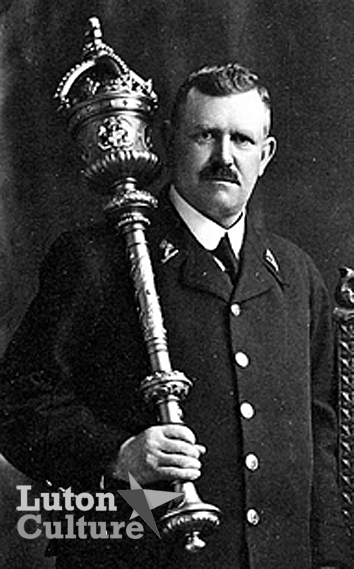At the start of riot trials at Beds Assizes in October 1919, defence counsels questioned Frederick James Rignall, manager of the public buildings of Luton, about Peace celebration arrangements in the town.
With no other council official or any member of the all-councillor Luton Peace Celebration Committee or their advisor, Town Clerk William Smith, due to appear in the witness box, Mr Rignall (pictured below) faced an hour of questioning.
He was asked by defence Counsel Mr Drysdale-Woodcock about the seething discontent in the town because of the way ex-servicemen thought they were being overlooked in connection with the peace festivities.
 He agreed no arrangements were made by the Town Council for giving a tea or entertainment to the men who had served the country, but that the suggested celebration included a banquet, for which the Mayor had issued a number of free invitations. To the suggestion that these numbered something like 200, Mr Rignall said he was not sure they were all free.
He agreed no arrangements were made by the Town Council for giving a tea or entertainment to the men who had served the country, but that the suggested celebration included a banquet, for which the Mayor had issued a number of free invitations. To the suggestion that these numbered something like 200, Mr Rignall said he was not sure they were all free.
“But surely no one would suggest a Town Hall banquet at which some would be expected to pay,” remarked the Judge, amid laughter.
Mr Woodcock replied that that was what was suggested, and Mr Hollis Walker KC (for the prosecution) said he believed it happened to be common in the case of Luton.
“Don't talk such nonsense,” interrupted Mr Hollis Walker when Mr Woodcock suggested that discharged sailors and soldiers were “invited to come on buying a 15s ticket for this banquet that was to celebrate their winning the war”.
“There was no evidence this banquet was to celebrate the winning of the war, and I protest against this,” said Mr Hollis Walker.
Further questioned, Mr Rignall said he did not know whether tickets at 15s apiece were offered to the DS&S Association, but he agreed that the organisation of the banquet created a good deal of ill-feeling among ex-servicemen, and that another cause of grave discontent was the refusal of the use of Wardown Park for a drumhead memorial service, organised by the DS&S Association.
Mr Rignall was asked to express his opinion as a resident as to whether, if such festivities as Lady Ludlow subsequently provided for ex-servicemen had been organised by the Council “we should have been here on this sad business”.
The Judge inquired on what issue this question arose, and counsel said he should suggest to the jury that if they felt bound to find prisoners guilty of riot, they might also find the conduct of the Mayor and the Corporation had been so provocative that they might feel inclined to make a strong recommendation to his Lordship in dealing with the men.
The Judge said he quite understood counsel's position, but it would be quite irregular for him to proceed on that line by cross-examination.
Chief Constable Charles Griffin's evidence took 55 minutes, and a laugh was raised when the Judge suddenly became curious to know where the Mayor was at the time the crowd were waiting for him to come out of the Town Hall. “In the Town Hall,” was the reply.
Counsel: “Do you know which part of the Town Hall?” - “Yes, I do”.
“I think you had better tell us,” suggested Mr Hollis Walker, but instead the Chief Constable told how when the speeches were being made at the front of the Town Hall some of the leaders asked if he would fetch the Mayor and Town Clerk out to speak to them, and said if they would come out they would undertake to give them a good hearing, but if not they were going to his house to destroy it.
“Did you communicate that to the Mayor?” - “I communicated with the Mayor and consulted with him and the Town Clerk as to what should be done.”
When the crowd went up to the Mayor's house he assured them the Mayor was not there, and offered to take someone nominated by the crowd up to the house so that he could satisfy himself.
His Lordship: “Did the election take place?” - “Yes, they appointed one man, and I took him up to the house.”
“But he could not find the Mayor?” - “No, he was not there.”
“But you say that if the Mayor came out they would give him a fair hearing?” - “I said that was what they said, but that was not the opinion I had formed.”
“I daresay a good deal of your advice not to speak to them was founded on your estimate of the Mayor.” - “There were various circumstances.”
“One can imagine that to some Mayors your advice might have been different?” - “Possibly so.”
His Lordship: “Perhaps their language might have been different if the Mayor had been another man?” - “I am afraid I can hardly express an opinion.”
Counsel: “The Mayor has resigned, hasn't he?” - “No.”
“No? He is still the Mayor?” - “So far as I know.”
“Is he here today?” - “I have not seen him.” (laughter)
“We should so much like to have a look at him,” observed counsel, amid a roar of laughter as he resumed his seat.

